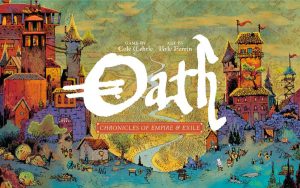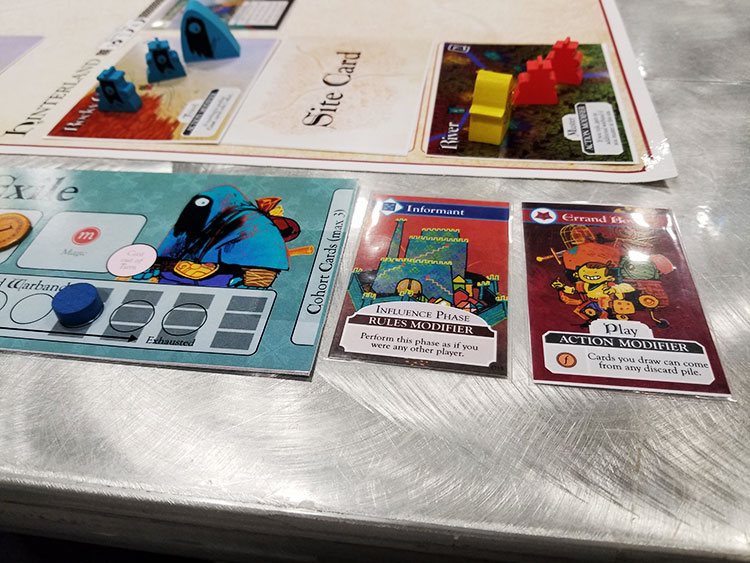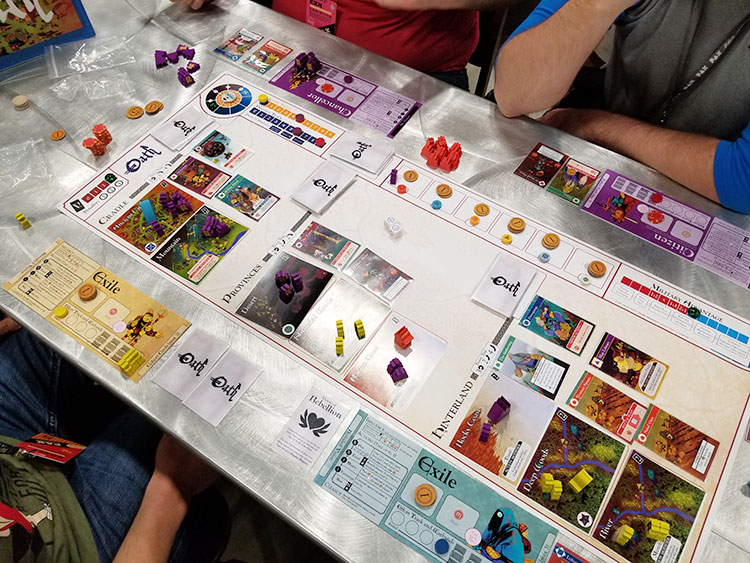 Cole Wehrle is a designer that is continually held in high regard. While maybe not the newest designer, Cole has been on an upward trend surrounding his releases. In the last two years, he has released two games that have generated Kickstarter hype and critical acclaim: Leder Games’ Root and his own company’s Pax Pamir Second Edition.
Cole Wehrle is a designer that is continually held in high regard. While maybe not the newest designer, Cole has been on an upward trend surrounding his releases. In the last two years, he has released two games that have generated Kickstarter hype and critical acclaim: Leder Games’ Root and his own company’s Pax Pamir Second Edition.
His ability to churn out Kickstarter successes persists with his upcoming game, Oath: Chronicles of Empire and Exile. It is currently available to back and is quickly approaching the million-dollar mark after being active for a week. Luckily for my friends and me, Leder Games made a trip to Pax South 2020 with a copy of Oath for demo. While one isn’t as experienced with complex games, my other friend and I were already backers and had played many of Cole’s other games. My duty is to report back with an overview of a turn, our particular game experience, and who will like and dislike Oath.
Turn Overview
Oath is a card-based game where one player plays as the Chancellor of a kingdom. The Chancellor rules many lands with militant might while performing one less action every round for the entirety of the game. The other players (anywhere from one to five others) are Exiles and have their minds set on finding a way to the throne for their own era of power.
Rounds are made up of the same three steps for every player. Beginning with influence, the active player is going to gain money from one of the six factions, which is represented by a suit on cards. The active player’s pawn will be at a site, and if there is a card at that site with a matching suit of a card they’ve played for themselves (what’s called the cohort), then they get two coins or a magic token. If they have no matches, they just get a coin. Each of the six factions has its own treasury, so if a suit is chosen for influence and their pockets are empty, then too bad. No money for you.

The active player may then take three actions (or two if Chancellor). To take an action, one must spend effort. For example, if one wants to take the muster action, it costs one effort. Player boards have a disc on an effort track with eight spaces. So to spend one effort to muster, the disc is slid one space to the right. If actions have been done prior and there are no more spots on the track, the action may not be taken and instead the rest action must be taken, which sends the disc back to the first spot on the track.
Looping back to the muster action, the player pays coins to a card at the site they stand, and for each coin paid, they may recruit two warbands to their army, which are stored in sets of three at the right end of their effort track. So if I have amassed a force of seven warbands, I now have three less effort I can use due to those spots being covered.
Actions like travel and play require X amount of effort, meaning that more than one effort could be spent. As for the play action, this is how more cards are gained. Cards can be drawn from the main deck or each site’s face-down discard. The number of effort spent is the number of cards drawn. Cards can provide minor actions, rule-altering powers, battle plans, instant-trigger abilities, or visions, which are alternate win condition that only the Exiles can trigger. This is where all of the game’s variety comes from.

The final action is campaigning, which is Oath’s version of combat. One effort is spent and an attack happens where the player’s pawn stands. The campaign targets an enemy at the site, but they are not limited to attacks on that card. Warbands are compared to all the targeted locations, and that sets the military advantage track, from a three-to-one advantage to an even battle. To win combat, the token must be in the blue, which begins at three-to-one. For each site targeted, the attacking player rolls a die, which is never good. They will shift the track to create more of a disadvantage. To shift the track back to the blue, the attacker must sacrifice warbands on their player board until they’re in a winning position. The defender has some options to also shift the track by discarding cohorts.
After three actions are taken, the final step triggers the tried-and-true board game cleanup phase. The next player does the same exact three steps until the game end triggers, which I will mention more in our game experience.

Personal Game Experience
One nice thing about Oath is that it’s quite easy to recollect what happens after the fact. It creates memorable stories. In most games, the Chancellor will get off to a lead. The oath in our game, the method for gaining victory points, was devoted to owning the most sites. The Chancellor starts off owning three and takes the first turn, so he “earned” the game’s first point. In the very next turn, the Fox Exile got off to an early burst of momentum by playing a card that gave him one magic by paying two coins. The card was also of the same suit as his source of influence, so each time he paid for magic, that money would go into the pockets of the very same people who were paying him at the beginning of his turns.
The other two Exiles, myself included, did not get off to good opening moves (more on why later). It got back to the Chancellor, who began to ponder on offering the Fox citizenship. When an Exile becomes a Citizen, they will flip their player board over to a purple side and turn their warbands into the Chancellor’s. Their VP marker then shifts to the prestige track, a separate track for the Chancellor and Citizens, and by taking exclusive actions they gain prestige. If the Chancellor has the most VP at game end, then the player with the most prestige will be the victor. This is what happened one round later as the Fox evened up the number of sites controlled. Citizenship was offered and accepted for an amount of prestige, meaning all the warbands became those for the Chancellor. But even as a Citizen, the Fox held the advantage among the table, taking more of a lead in prestige than he had in VP.

The tide shifted once the four-armed yellow Exile mustered and readied for his first campaign. At this point, the Chancellor owned five of the eight total sites, and the yellow Exile desired for that to end. His force was quite big and he targeted three of the Chancellor’s sites, pulling off a victory that only caused two casualties. So with yellow now looking strong, the Chancellor set his eyes on the weakest player, the blue Cyclops that ruled two lands… aka me. With one warband in my army and two on sites, I lost it all with no struggle, leaving me with just my pawn.
So what do I do when my turn rolls back around? That’s right: cycle through the deck for a handy dandy vision card. And lo and behold, the perfect one fell into my clutches: “you win at the start of your turn if three visions have been seen and have the most popular support.” Well, this was the third vision that had been found, with the other two being a waste of time to pursue and deep in the discard. Popular support means you check the treasuries of each suit of cards in your cohort and that is your total. I wasn’t there yet, but I was close. So for my final action in my turn, I searched the deck again, this time looking for a card of the most popular suit. Thanks to the Fox pumping money into one faction, I nabbed one that matched and BOOM: I became the most popular man in the kingdom.

Now the Fox player had one chance at winning our game of Oath. After five rounds of play, a six-sided die is rolled to determine if the game ends now or later. We had played five rounds, so rolling a six would trigger the game end and the Fox would be the victor. But in this reality, he rolled a one, so the game continued. The Chancellor paid money equal to the Fox’s popularity, which pushed him back into exile. So the Fox responded in the only reasonable manner, using a card he had acquired to move money into the hands of the suits that would for certain make me most popular, thus handing me a victory.
Now we have the “legacy” aspect of Oath to talk about. If we were to play again, I would be the new Chancellor due to my victory. Six random cards from the ones we used would be removed and six new ones would be added. The cards added would match the suits of the cards in my cohort, symbolizing that the factions that supported me would be more prominent in the kingdom. Maybe the biggest change for the next game would be that the win condition would match how I became Chancellor. VP would be awarded at the end of a player’s turn if they were the most popular instead of ruling the most lands. The map would also be adjusted as well.

Who is Oath For?
Some very simple questions can rule out if you should become a backer of Oath.
Number 1: Do you think that you will play Oath multiple times? If the answer is no, then Oath is not for you, and that is straight from the mouth of those that taught us the game. Oath is not like Eurogames where pulling it off the shelf, playing it once, and then returning to it in six months to a year will suffice. This is a game that requires multiple plays to understand what determines a good move. I mentioned it prior, myself and the yellow Exile started off slow because we didn’t understand a good card from a bad card. Our experience was very much “pull levers and see if they make good moves.” This will be the case for most new players to Oath, and not playing the game regularly will put that in the spotlight.

Number 2: Do you enjoy mean decisions and chaos in your games? If the answer is no, then Oath is not for you. As you can see from my personal experience, I went from not having a chance at all to becoming the new Chancellor all in a handful of turns, and without a military to help. This will be a recurring theme for each play in Oath. The abilities cards offered can shift strength in a single action, but that is ok if you understand that the cards can be very powerful. Grudges will often be held not only during a game, but between plays as well. Oath is a model of a living, breathing kingdom in card-form, and bad blood flows in Oath much like reality.
Number 3: What games does Oath feel like? If you want to back Oath because you like Root, you’re going to be in for a shock. In my opinion, Root is a wargame, while Oath is rooted (see what I did there) in its flow of cards and money. Most fans of the Sierra Madre Pax games will feel right at home here. Both Oath and Pax games are focused on money exchanging hands and cards dictating what happens. Both are also chaotic and hard to see strategies. Games I might also give a slight relation to Oath from their contained economies might be The Great Zimbabwe and Keyflower.
Number 4: Will I be remaining a backer? At the top of the article, I said that I was a backer of Leder Games’ latest project. And I am happy to say that it lives up to the expectations I had set based around Cole’s pedigree. Turns are easy to understand due to a low number of actions and combat is a breeze. Kyle Ferrin’s art has to be mentioned, for his penmanship is part of the appeal of the Leder releases. I will be remaining a backer and hope my experience with Oath has given you enough information to back it yourself.
If you are interested in finding out more about Oath: Chronicles of Empire and Exile, it’s now in funding on Kickstarter. So head over to the campaign page for more info, or to become a backer.






















You gain double the number of cards for each effort
There is a penalty of 1 for each vision seen up to 3 when drawing from the main deck but not the discards
If you were rifling through the main deck this would have required quite a lot of effort
Question: if you are able to draw 2 favour but the site is empty can you draw a magic instead?
I went by this table a few times over the weekend, and could never get into a game.
It looked great. Thanks for the post.